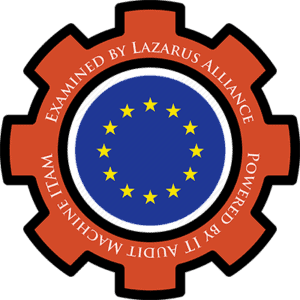GDPR Audit and Assessments; we are ready when you are! Call +1 (888) 896-7580 today.

Lazarus Alliance will coordinate directly with your organization to schedule your General Data Protection Regulation (GDPR) compliance assessment. Our assessors will help identify the necessary compliance measures based on your company’s specific data processing activities and business requirements. Your company will achieve GDPR compliance certification upon demonstrating adherence to the regulation’s data protection principles and organizational obligations.
The General Data Protection Regulation (GDPR) is a mandatory regulation for organizations processing personal data of EU residents, enforced by the European Union. It establishes a comprehensive framework to ensure robust protection of personal data, outlining principles and requirements for data security, lawful processing, and the protection of data subjects’ rights, enabling trust in digital services and data handling.
General Data Protection Regulation (GDPR)
The General Data Protection Regulation (GDPR), established under Regulation (EU) 2016/679, is a European Union regulatory framework designed to ensure the protection of personal data processed by public and private entities. Its primary purpose is to safeguard the rights of data subjects by promoting a consistent, risk-based approach to data protection, ensuring lawfulness, fairness, transparency, purpose limitation, data minimization, accuracy, storage limitation, integrity, confidentiality, and accountability.
The GDPR applies to:
-
Public entities: All public administration bodies within the EU, including central, regional, and local government organizations, to secure their data processing activities and protect personal data.
-
Private entities: Organizations processing personal data of EU residents, including those offering goods or services in the EU or monitoring individuals’ behavior, such as businesses, service providers, or data processors.
The regulation mandates the implementation of technical and organizational measures proportional to the risk level of data processing activities. Compliance involves demonstrating adherence to GDPR principles through documentation, risk assessments, and, where applicable, audits or certifications. This ensures robust protection of personal data and mitigates risks of data breaches or misuse.
Frequently Asked Questions
What qualifies as personal data under GDPR?
Personal data includes any information relating to an identified or identifiable individual, such as names, email addresses, IP addresses, or biometric data.
What are the key principles of GDPR?
GDPR is based on principles like lawfulness, fairness, transparency, purpose limitation, data minimization, accuracy, storage limitation, integrity, confidentiality, and accountability.
What is a Data Protection Impact Assessment (DPIA)?
A DPIA is a risk assessment required under GDPR for high-risk data processing activities, helping organizations identify and mitigate risks to data subjects’ rights.
Do small businesses need to comply with GDPR?
Yes, any organization processing personal data of EU residents must comply, though the scale of measures may vary based on the size and nature of data processing activities.
How often should GDPR compliance be reviewed?
Compliance should be reviewed regularly through ongoing monitoring, data protection impact assessments, and periodic audits to ensure adherence to GDPR as data processing activities or regulations evolve.
How can an organization achieve GDPR compliance?
Organizations must implement technical and organizational measures, such as data protection policies, staff training, encryption, and processes for handling data subject requests, followed by regular audits and assessments.

Benefits of GDPR Compliance
The benefits of achieving compliance with the General Data Protection Regulation (GDPR), as regulated by Regulation (EU) 2016/679, are significant for both public and private entities, ensuring robust data protection and compliance with EU standards. Below are the key benefits:
-
Enhanced Data Protection: GDPR compliance ensures that personal data processing meets stringent requirements for lawfulness, fairness, transparency, purpose limitation, data minimization, accuracy, storage limitation, integrity, and confidentiality. By implementing risk-based measures, organizations reduce vulnerabilities and protect against data breaches or unauthorized access.
-
Regulatory Compliance: For entities processing personal data of EU residents, GDPR compliance is mandatory to adhere to EU regulations. Public and private organizations, including those offering goods or services in the EU, meet legal obligations, avoiding substantial fines or legal penalties.
-
Increased Trust and Credibility: Compliance demonstrates a commitment to data protection, enhancing trust among data subjects, clients, partners, and stakeholders. Organizations can showcase adherence to a globally recognized standard, strengthening their reputation for reliability and responsibility.
-
Access to EU Market Opportunities: Private organizations with GDPR compliance gain a competitive edge when operating in the EU or collaborating with public entities, as compliance is often a prerequisite for partnerships in sectors like healthcare, finance, or technology.
-
Risk Management and Resilience: The GDPR framework promotes a risk-based approach, requiring organizations to identify, assess, and mitigate data protection risks systematically. This improves operational resilience, reduces the likelihood of incidents, and ensures faster recovery from potential breaches.
-
Standardized Data Protection Practices: Compliance aligns data processing activities with a unified set of principles, fostering consistent and interoperable data protection practices across departments or business units. This is particularly beneficial for large organizations or those operating in complex data environments.
-
Protection of Personal Data: GDPR compliance ensures robust protection for personal data, aligning with legal requirements and reducing the risk of liabilities or reputational damage from data breaches or misuse.
-
Market Differentiation: For private entities, GDPR compliance signals a high level of data protection maturity, distinguishing them from competitors in industries where privacy is a priority, such as technology, e-commerce, or service providers.
-
Support for Digital Transformation: By securing personal data, GDPR compliance enables organizations to safely adopt digital technologies, cloud services, and data-driven initiatives, supporting innovation while maintaining compliance.
-
Continuous Improvement: The compliance process encourages ongoing adherence through regular data protection impact assessments, audits, and updates to policies, ensuring organizations maintain and enhance their data protection measures in response to evolving risks.
By achieving GDPR compliance, organizations not only meet regulatory requirements but also build a stronger, more secure foundation for their operations, fostering trust and enabling secure collaboration in the EU and beyond.

Talk with one of our experts
Our Lazarus Alliance Cybervisor™ teams have experience performing thousands of assessments for organizations providing services to clients around the world.
We're here to answer any questions you may have.

GDPR Compliance Assessment Process
The compliance assessment process for the General Data Protection Regulation (GDPR), as regulated by Regulation (EU) 2016/679, involves a structured series of stages to verify that an organization’s data processing activities comply with GDPR requirements. Below is a clear description of the assessment process, aligned with best practices for data protection compliance and certification bodies like Lazarus Alliance:
- Application and Agreement
- Description: The organization seeking GDPR compliance assessment submits an application to a qualified assessment body. The application includes details about the data processing activities, their scope, and the applicable GDPR requirements.
- Activities: The assessment body reviews the application for completeness and feasibility, defines the scope of the assessment, and agrees on a formal contract with the client, outlining responsibilities, timelines, and costs.
- Outcome: A formal agreement is signed, ensuring the client commits to providing necessary access and documentation for the assessment process.
- Documentary Review (Stage 1)
- Description: The assessment body conducts an off-site review of the organization’s documentation to assess compliance with GDPR requirements.
- Activities:
- Review of the organization’s data protection policies, data processing records, data protection impact assessments (DPIAs), and procedures for ensuring lawfulness, fairness, transparency, purpose limitation, data minimization, accuracy, storage limitation, integrity, and confidentiality.
- Verification that data protection measures align with GDPR principles and the organization’s specific data processing activities.
- Identification of any gaps or non-conformities in documentation.
- Outcome: A report is issued detailing findings, including any non-conformities that must be addressed before proceeding to the next stage. The organization may need to implement corrective actions.
- On-Site Evaluation (Stage 2)
- Description: The assessment body conducts an on-site evaluation to verify the implementation and effectiveness of the data protection measures documented in Stage 1.
- Activities:
- Inspection of technical and organizational measures, including access controls, data encryption, data breach response mechanisms, and data subject rights processes.
- Interviews with personnel to confirm adherence to documented data protection procedures.
- Testing of technical measures (e.g., pseudonymization, data security systems) and operational processes to ensure compliance with GDPR requirements.
- Assessment of compliance with any corrective actions identified in Stage 1.
- Outcome: A detailed evaluation report is produced, highlighting compliance status and any remaining non-conformities. Major non-conformities must be resolved before compliance certification can be granted.
- Compliance Decision
- Description: The assessment body reviews the findings from both stages to make an impartial decision on granting GDPR compliance certification.
- Activities:
- An independent review committee or designated decision-maker evaluates the assessment reports, ensuring objectivity and alignment with GDPR requirements.
- Verification that all non-conformities (major and minor) have been adequately addressed.
- Outcome: If compliant, the organization is granted GDPR compliance certification, valid for a defined period (typically subject to ongoing compliance obligations). The assessment body issues a certificate or attestation of compliance.
- Surveillance Assessments
- Description: Periodic assessments are conducted to ensure ongoing compliance with GDPR requirements.
- Activities:
- Regular surveillance assessments (e.g., annual or as required) to verify continued adherence to data protection measures.
- Review of changes to data processing activities, DPIAs, or data breach incidents since certification.
- Assessment of records of data subject requests and corrective actions taken by the organization.
- Outcome: A surveillance report confirms compliance or identifies non-conformities requiring corrective action to maintain certification.
- Renewal Assessment
- Description: At the end of the certification validity period or as required, a renewal assessment is conducted to recertify compliance with GDPR.
- Activities:
- A comprehensive re-evaluation similar to Stages 1 and 2, assessing data processing activities against current GDPR requirements and any updates in applicable regulations.
- Review of surveillance assessment findings and the organization’s ongoing compliance.
- Outcome: If successful, a new certificate or attestation is issued, extending compliance for another cycle. Non-conformities may delay or prevent renewal until resolved.

Additional Notes for GDPR Compliance Assessment
- Accreditation Requirements: The assessment body (e.g., Lazarus Alliance) must be accredited or recognized by a competent authority within the EU, such as a national data protection authority or an accreditation body, to ensure impartiality and competence in conducting GDPR compliance assessments, aligned with relevant standards such as ISO/IEC 17065:2012 where applicable.
- Client Responsibilities: The organization must provide access to documentation (e.g., data processing records, DPIAs), personnel, and relevant systems, maintain records of data subject requests or complaints, and notify the assessment body of significant changes to data processing activities, as required for compliance verification.
- GDPR-Specific Considerations: The assessment process aligns with GDPR’s focus on risk-based data protection measures, with stricter requirements for high-risk processing activities (e.g., large-scale processing of sensitive data). Guidance from national data protection authorities or the European Data Protection Board (EDPB) may be incorporated into the assessment process to ensure compliance with GDPR principles.
- Non-Conformities: Any non-conformities identified during assessments must be addressed within a timeframe agreed with the assessment body. Major non-conformities (e.g., critical data protection gaps) typically require resolution before certification or attestation of compliance, while minor ones may be addressed during ongoing surveillance or follow-up assessments.
This structured process ensures that assessed organizations meet GDPR’s rigorous data protection standards, safeguarding personal data and enabling compliance with EU regulations.
